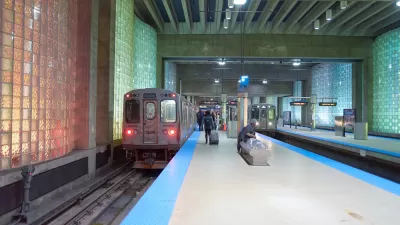21 months after Chicago's Infrastructure Trust was launched by Mayor Rahm Emanuel, the program finally has its first approved project. After delays and substantial downsizing, Bank of America will invest $13 million in energy efficiency improvements.
With an assist from former President Bill Clinton, Chicago mayor Rahm Emanuel unveiled his plans for an infrastructure bank to fund investment in energy-efficiency improvements, transportation and other projects with great fanfare nearly two years ago. Though the program has been discussed as a pioneering public-private partnership with the potential to change the way our cities get built, it has struggled to fulfill its promise.
Last week, the program finally won approval for its first project–energy efficiency improvements in public buildings–"but only after the work was scaled back again due to lack of interest from investors," reports Bill Ruthhart.
“This is the only project. It’s been about two years since we approved (the trust), and this is the project we have, a $13 million retrofit project,” said Ald. John Arena, 45th. “(The trust) is not what it was sold to do.”
"Emanuel once featured the infrastructure trust as a staple in his speeches, listing it among his early successes, but the mayor rarely mentions it now," notes Ruthhart. "Nor was the infrastructure trust project approval mentioned Wednesday in the collection of news releases the mayor’s press office puts out after each council meeting to highlight the administration’s victories."
FULL STORY: First Emanuel infrastructure trust project approved after delays

Study: Maui’s Plan to Convert Vacation Rentals to Long-Term Housing Could Cause Nearly $1 Billion Economic Loss
The plan would reduce visitor accommodation by 25,% resulting in 1,900 jobs lost.

North Texas Transit Leaders Tout Benefits of TOD for Growing Region
At a summit focused on transit-oriented development, policymakers discussed how North Texas’ expanded light rail system can serve as a tool for economic growth.

Why Should We Subsidize Public Transportation?
Many public transit agencies face financial stress due to rising costs, declining fare revenue, and declining subsidies. Transit advocates must provide a strong business case for increasing public transit funding.

How to Make US Trains Faster
Changes to boarding platforms and a switch to electric trains could improve U.S. passenger rail service without the added cost of high-speed rail.

Columbia’s Revitalized ‘Loop’ Is a Hub for Local Entrepreneurs
A focus on small businesses is helping a commercial corridor in Columbia, Missouri thrive.

Invasive Insect Threatens Minnesota’s Ash Forests
The Emerald Ash Borer is a rapidly spreading invasive pest threatening Minnesota’s ash trees, and homeowners are encouraged to plant diverse replacement species, avoid moving ash firewood, and monitor for signs of infestation.
Urban Design for Planners 1: Software Tools
This six-course series explores essential urban design concepts using open source software and equips planners with the tools they need to participate fully in the urban design process.
Planning for Universal Design
Learn the tools for implementing Universal Design in planning regulations.
Ascent Environmental
Borough of Carlisle
Institute for Housing and Urban Development Studies (IHS)
City of Grandview
Harvard GSD Executive Education
Toledo-Lucas County Plan Commissions
Salt Lake City
NYU Wagner Graduate School of Public Service



























